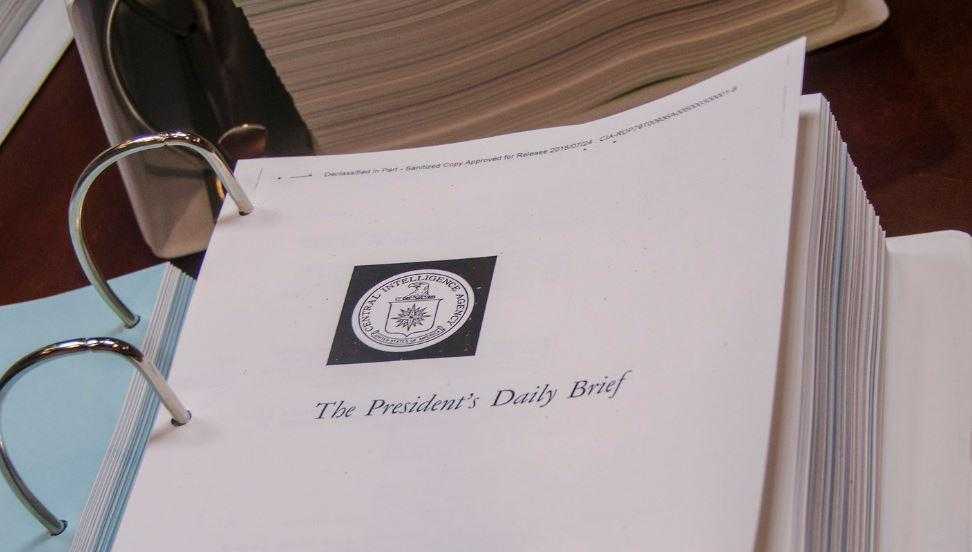This is part of our series profiling CIA officers in various positions throughout the Agency. We talk with them about their daily challenges and rewards, as well as some exceptional moments. We recently sat down with an officer, who is on rotation as a PDB briefer, to learn more about his journey to CIA and his experiences here.
* * * * * * * * * * * *
President’s Daily Brief (PDB) briefers are the day-to-day voice of the Intelligence Community (IC) with executive-level decision-makers. They serve as a primary link between various components within the IC and CIA and the President, as well as senior officials within the administration. Briefers normally serve a one or two-year tour.

Tell us about your path to CIA:
My path to CIA started when I was six years old. I remember in kindergarten begging my mom for a spy-themed birthday party because of how much I idolized my dad and my grandparents, who were all career CIA officers. While there was not much I could do in elementary school to prepare for a job at CIA, I spent most of high school and college pursuing history, political science, and international affairs.
I applied to CIA the first semester of my senior year of college and had an interview a few months later. Before the formal interview began, an officer handed me a pen, blank paper, and an essay prompt that read, “if you could meet anyone—real or fictional—who would it be and why?”
My response was simple. “I would elect to meet the man my dad becomes when he goes to work each day here at CIA because, up until this moment, I have never had insights into what he does except for the vague awards he brings home. Meeting my dad at work would be like meeting Superman.” The recruitment officer, a father himself, felt the need to walk the essay over to my dad’s office. I found out later that my dad had it framed, and it is still hanging in his office 11 years later.
I entered on duty as a CIA Logistics Officer in the Directorate of Support (DS) shortly after graduating college. I spent two years in the DS and then transferred to the Directorate of Analysis, where I have worked ever since.
Why did you choose CIA?
Like many other millennials who work at CIA, 9/11 cemented my desire to commit my life to public service. I wanted to help defend against foreign threats to our country and help policymakers identify potential solutions to those threats. I remember being proud to have a parent working for CIA in the aftermath of 9/11, and now as a father of three, I have deep satisfaction knowing my kids are proud of the work I do.
What is a typical day for you like?
As a PDB briefer, my day starts early. From the moment that I wake up at 1am, I check my email to see if my PDB customer—a cabinet secretary—had any changes to his schedule overnight that could impact which intelligence products I share with him that day. I also check to see if my briefing has been delayed in hopes of squeezing in an hour or two of more sleep.
The upside to arriving at work at 2:30am is that there is no traffic, and the parking at CIA Headquarters is fantastic! What happens once I enter the office is akin to mastering the content of about 20 graduate-level essays on several unrelated foreign policy issues within three hours, and then distilling everything into a 15-minute briefing for one of the most powerful people in Washington.
I start by combing through all of the intelligence reporting that analysts across the IC have flagged for me, as well as the finished intelligence they produced over the past 24 hours. This takes upwards of an hour or two to sift through. By 4am, I typically have all of the intelligence products identified that I want to share with my customer. Then, I begin rehearsing what I intend to say during my briefing.
PDB Briefers normally have analytic expertise in only one, maybe two regions of the world. To help us master the content of our briefings, the analysts who author the intelligence products that published overnight start showing up to work at 5am to “pre-brief” us. It often feels like a study-group cramming for a final exam.
The briefing at my customer’s D.C. office begins promptly at 8am. As we talk through the day’s PDB, I listen to feedback on each piece and jot down follow-up questions to have answered during the next briefing. I normally get back to the office around 9:30am for the daily feedback session when all of the PDB briefers relay feedback from their senior customers on that day’s PDB. We then consolidate the feedback to send to the relevant offices and collectors around the IC.
From 11am onwards, I work with analysts across the IC to answer questions that came up during the briefing. After a late lunch, I get to go home to be with my family until evening. Then, it is time to sleep.
What is the most rewarding aspect of your work?
I try to imagine the amount of personal sacrifice from across the IC that went into producing the intelligence that made its way into the PDB each morning. It is always incredibly rewarding to see my customer delve into the PDB, especially when he is very engaged on a topic, asks hard questions, or provides positive feedback on the intelligence that I can share with the officers involved.
What have you found most challenging about working here?
As you can tell from my daily schedule, this job requires significant sacrifice not just from me, but also from my wife and kids. I am forever grateful to them for undertaking this sacrifice with me for what I think is a worthwhile cause – to seek to know the truth and to speak that truth to power.
What has surprised you about working here?
The level of trust that CIA puts into our officers is unparalleled. As a relatively young officer, I am empowered to meet with a cabinet secretary one-on-one. I do not think you will find the same level of trust and responsibility for junior to mid-level officers anywhere else in the government.
